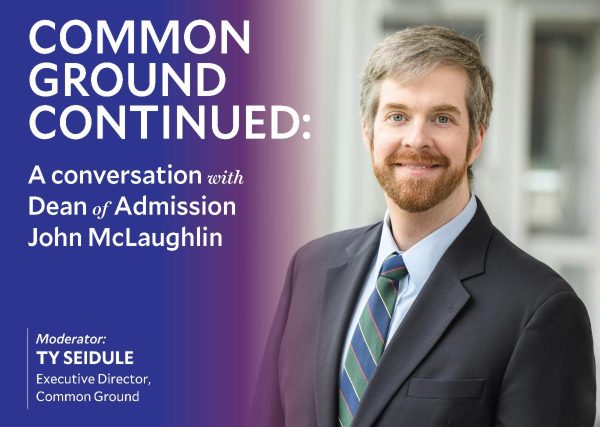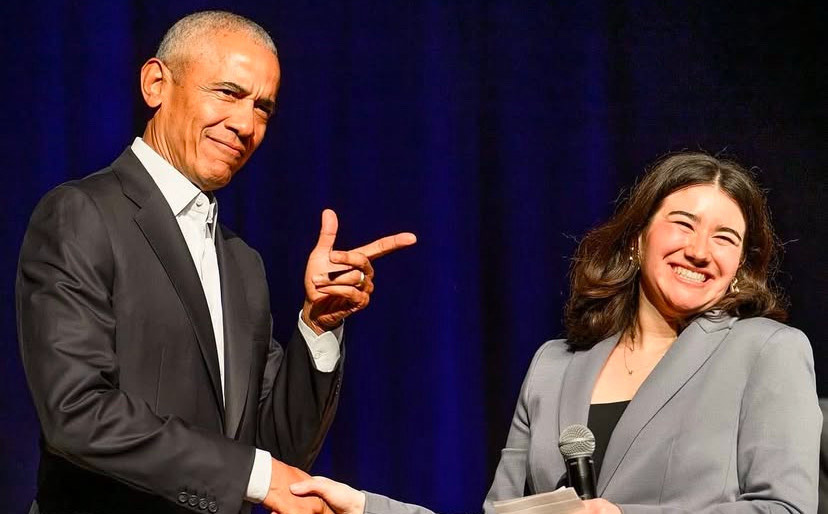
On Thursday, May 1, students, faculty and visitors gathered in the Events Barn for the inaugural Common Ground Continued event. The conversation served as a continuation of the most recent Common Ground discussion on Affirmative Action between Harvard Law Professor Annette Gordon-Reed and Manhattan Institute’s Heather Mac Donald. This Thursday, however, the guest was not an external speaker. Instead, it was Hamilton’s Dean of Admissions, Dr. John McLaughlin. Ty Seidule, Executive Director of Common Ground and a Visiting History Professor, hosted the session.
McLaughlin began the dialogue by offering his thoughts on the earlier Affirmative Action debate. He expressed his frustration at the misinformation and questionable interpretations of data by both guests, particularly Heather Mac Donald. McLaughlin drew on his education in data science and twenty years of experience to outline where the guests went wrong in their commentary.
Seidule then asked McLaughlin to explain the two frequently cited justifications for Affirmative Action: compensatory rationale and educational rationale. McLaughlin explained that compensatory rationale seeks to address past and present societal injustices by granting particular historically disadvantaged groups preferential treatment. He observed that this was a topic exhausted by the previous two speakers, despite its long-held unconstitutionality.
Alternatively, there is the educational rationale, which contends that diverse student bodies foster stronger communities and a more successful learning environment.
McLaughlin expressed frustration at the focus placed on the compensatory rationale by both Gordon-Reed and Mac Donald, stating he believed that educational rationale had far more merit.
McLaughlin continued to push back on some of the evidence presented by the speakers, particularly the “mismatch theory.” Mismatch theory, McLaughlin told The Spectator, “suggests that some students struggle when put into environments considered to be too competitive relative to their preparation.” In the previous discussion, this was a central component of Donald’s argument against race-based affirmative action. She contended that affirmative action led to the rejection of well-qualified students, replaced by under-qualified applicants, who were more likely to struggle throughout their college careers.
McLaughlin cited a different theory, the “undermatch theory,” which, according to McLaughlin, suggests, “some students opting to enroll in less competitive environments struggle because the opportunities and resources in those environments are not what they would find in a school that is appropriate for their preparation.” In his conversation with The Spectator, McLaughlin emphasized that the two are not mutually exclusive despite often being placed in opposition to one another. McLaughlin then remarked that he “find[s] the evidence on undermatching to be more convincing and compelling.”
McLaughlin continued to offer his perspective on affirmative action as a whole, stating, “It’s my belief that colleges and universities still have an interest in trying to bring in diverse classes and we want to think about how we can do that as best as we can without assigning any specific goal or target that we’re working towards.”
With the conversation coming to a close, Seidule opened the floor for public comments. Questions ranged from the impact of affirmative action on international students to how Hamilton was adjusting to the landmark judicial ruling. In response to an inquiry on the various scholarship programs on campus, such as Posse, QuestBridge and Opportunity Program, McLaughlin stressed that “none of these programs have race or ethnicity as an inclusion criteria.” Although, he cautioned that such initiatives may be the next topic of court cases in the higher education arena.
This discussion was the inaugural Common Ground Continued event. Seidule hopes the program continues to expand and that this was the first of many of this variety. “Why not use our own campus expertise?” Seidule told The Spectator. Specifically regarding the event on Thursday, he continued by saying, “Here’s a chance to talk through both the theory and practice and how it happens at Hamilton College.” Seidule also expressed interest in eventually expanding the program beyond Common Ground topics.

















